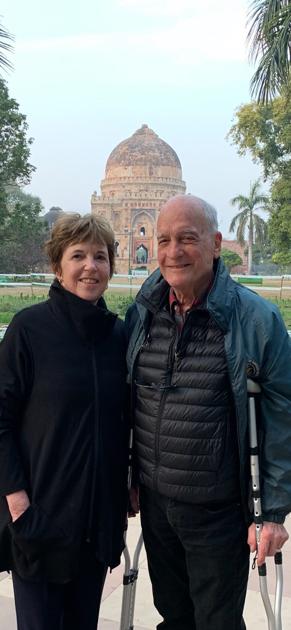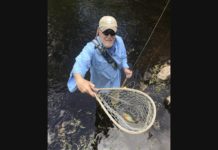Responding to headlines that our country’s coronavirus death toll is rising fast isn’t the start I sought for my week-before-Thanksgiving column.
Still, this emergency demands sharing the background and expedient contents of a recent gut-wrenching message received from a junior/senior high school friend, Robert Gettleman.
Distilled from a gruesome medical history, Bob’s emphatic insights hit me with a wallop. Yet being an unfortunate polio victim has perfected invincible Gettleman family resistance that prevails despite this latest setback.
My portion of the episode originated with a Chicago area code phone message received 15 years ago requesting I contact “Robert Gettleman.”
My response reached a pleasant but all-business assistant who demanded a reason for the call. Gently I explained about going to school with a Robert Gettleman in Miami Beach.
“I’m a Wyoming float trip guide, so ‘fishing’ might be the basis,” I said.
“Yes, that would definitely be Judge Gettleman,” the now enthusiastic woman exclaimed, adding that my high school friend was a United States District Court judge for the Northern District of Illinois, appointed by President Clinton in 1994.
Soon Bob was on the phone, reporting that he and his sensational wife, Joyce, expected to attend legal seminars at Jackson Lake Lodge. Although we hadn’t visited since our 1961 Beach High graduation, somehow the judge tracked me down to arrange a day of fly-fishing during his Wyoming visit.
I haven’t followed detailed achievements of my high school class but I do know Beach High 1961 produced a goodly number of excellent attorneys, skilled medical professionals, superb teachers, exceptionally creative business/retail/developer types and a slew of community and national leaders who pursued survivability of the creative and cultural arts.
With degrees from Boston University and Northwestern University School of Law, Judge Gettleman has achieved excellence in his chosen legal profession. But in the pursuit of total honesty I must report that a tidbit of his earlier life was slightly more austere. Bob and his pals rarely came directly to school. They detoured and were regular early a.m. activists on local fishing piers. Their bait- and fish-blood-stained T-shirts, pants and pockets (bristling with knives and lures) earned them odor segregation in some unsympathetic teachers’ rooms. My shared access to this group came as another preschool Biscayne Bay seawall and bridge rat. Without exception, fishing trumped ball sports and socializing.
I remembered Robert Gettleman as being above average height, but he laboriously hobbled around, his movement restricted by a heavy leg brace. Only recently did I learn that shortly after his family moved to Miami Beach from New Jersey, Bob was infected by the polio virus in June 1950. Bob beat terrible odds of surviving, but he didn’t escape dreadful pain, paralysis and a full year in hospitals and rehab. Magically his right leg regained its strength, and after surrendering 10 years of his life to learning to walk with crutches and a heavy brace, he shed the brace at age 17 but still walked with a limp.
Despite a forbidding weather forecast that would have caused normal anglers to reschedule, Bob and Joyce were determined to discover everything our charming Snake River had to offer. It was a joy to introduce my high school friend to our handsome cutthroat and see him thrill to the disappearance of his dry fly inside a hungry white mouth.
Joyce did not fish, but as a veteran psychotherapist she probably understood — better than her husband or their guide — why the addictive state of fishing affects so many. Joyce was marvelous support. I don’t think she drew from her theater major training, but she seemed truly disappointed at a recommendation to wrap up our efforts a tad early before the weather turned worse.
Since our float Judge Gettleman and I swap fishing and outing reports. I’m always delighted when I see an article or reference to the Gettleman’s Pulitzer Prize-winning son, Jeffrey, who serves as the New York Times bureau chief in India.
Now comes the distasteful part of this column that will introduce an explanatory relevance. In late August a brief email from the judge arrived, saying, “Thought you might like seeing the op-ed piece I wrote that appeared in the Chicago Tribune last month.”
Bob’s commentary, “A polio survivor’s unique prism into the value of social distancing,” published in the Tribune on July 17, reduced me to tears.
I didn’t know that in his early 70s the judge suffered several falls that injured his legs. And after 55 years of relative freedom, post-polio syndrome set in. Painfully, he’s back on crutches and has a leg brace. The relative freedom and mobility — abilities to go fishing in boats with friends and family — are gone. Vanished! Out the door!
With this returned disability Bob is again dependent on others for many things he once did solo.
Where is this going, you ask?
Again there is a terrible virus infecting millions. Only unlike in Bob’s youth, when polio randomly appeared, today we’ve discovered the game plans of how such ugly virus infections are spread. Polio fanned out from the mouth droplets of an infected person’s sneezes or coughs and by touching your face after contact with the virus.
Bob’s poignant article emphasizes that in the 1950s there wasn’t any suggestion of “social distancing” nor even a vague hint of wearing a mask to prevent the spread of polio virus. Hand washing and sanitizers weren’t in the forefront, either.
“There was no Dr. Fauci,” Bob said.
He recalls the “random strikes that left kids like me either dead or with lifelong disabilities that could have been prevented or reduced by the measures put in place for the coronavirus.”
Back then the world awaited a miracle vaccine, developed by Dr. Jonas Salk, which arrived four years after Bob was infected and paralyzed.
The judge reflects that when he hears about relaxing indoor gathering measures, rallies, parties, the impatience to reopen and seeing mostly younger groups socializing without masks, “I see history repeating itself.”
In closing, my wise friend issues a thoughtful verdict from his very experienced position on life’s medical bench.
“I can’t help but wonder whether social distancing, good hygiene and masks would have avoided the way my life changed 70 years ago. But I am certain of one thing: I so wish Dr. Fauci had been around in 1950.”
Judge Robert Gettleman has offered a fine observation on the state of our medical situation. His renewed suffering hurts me but his words emphasize a direction I plan to follow, religiously.
I’ve saved all of Bob’s messages to me over the last few years, and I’ll end with one of his thoughtful remarks.
“Life takes us in strange directions, but I am glad you continue to enjoy the outdoors. A small part of me lives vicariously through your experiences.”
Credit: Source link






























